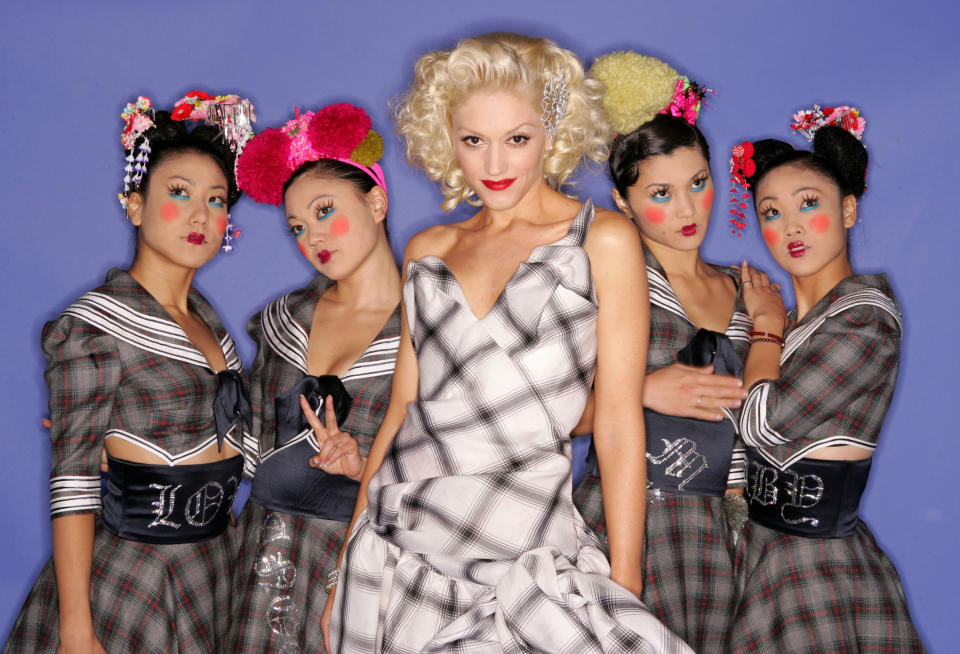Gwen Stefani defends all-Asian backup dancers from her Harajuku Girls era
Gwen Stefani is once again defending herself over the Harajuku Girls era of her solo career.
Stefani has long been accused of cultural appropriation for appearing both onstage and off with the Harajuku Girls, a dance troupe of women who were all of Japanese ancestry, during the early years of her solo career.

Now, in a new interview with Paper magazine, the Grammy-winning singer insists the backlash was uncalled for — and says she believes people from different cultures should be allowed to "share" with one another.
"If we didn't buy and sell and trade our cultures in, we wouldn't have so much beauty, you know?" said Stefani. "We learn from each other, we share from each other, we grow from each other."
"And all these rules are just dividing us more and more," she added.

Stefani said her "fascination" with Japanese culture began as a child when her father worked in Japan. He would bring home Sanrio toys for his daughter and share details about the fashionable Harajuku district in Tokyo.
When her band No Doubt traveled to Japan in 1996, "It was a pretty big deal for me," Stefani recalled.
Once the "Hollaback Girl" singer embarked on a solo career, she decided to bring a bit of Japan back home to U.S. audiences.
"I never got to have dancers with No Doubt. I never got to change costumes. I never got to do all of those fun girl things that I always love to do," Stefani explained. "So I had this idea that I would have a posse of girls — because I never got to hang with girls — and they would be Japanese, Harajuku girls, because those are the girls that I love. Those are my homies."
The four women — who went by stage names Love, Angel, Music and Baby — were often mentioned in Stefani's work and their names served as the title for her debut solo album in late 2004.
Stefani, who would later go on to create a Harajuku Lovers clothing line, added that Japan is "where I would be if I had my dream come true, I could go live there and I could go hang out in Harajuku."
Among Stefani's critics is comedian Margaret Cho. In 2005, Cho wrote a candid essay calling the Harajuku Girls a "minstrel show," arguing they reinforced negative stereotypes about Asian women.
Therèsa M. Winge, an associate professor of apparel and textile design at Michigan State University who authored a 2008 paper on the styles of Tokyo's fashionable district, argued that the situation is nuanced.
"It really is very complex because this is not a situation of cultural appropriation only... there is a level of appreciation that Stefani used to justify her actions," she told TODAY in an email. "It is cultural appropriation even though Stefani hired the young women to portray her version of Harajuku Girls for performances and personal appearances. Regrettably, Stefani borrowing a style for her dress and her backup performers, even a street style that originated and visually defines a portion of a society and in this case ethnic group, is cultural appropriation."
In this case, Winge said, many of the Japanese Harajuku style subcultures emerged from styling salons in the area using young people as models to attract future clients, followers and influencers — so, in simplest terms, to spread the look far and wide.
"It is likely that companies and brands will lead to curated street styles and subcultures because of the saturation of the markets and evolution of marketing/retail/brands," she explained.
Winge added that it didn't seem like Stefani wanted to take something away from the Japanese street-style subcultures, "however, she quickly transitioned away from the Harajuku Girls when these concerns (of appropriation) first surfaced."
Stefani previously addressed the Harajuku Girls controversy in a 2019 interview with Billboard.
The singer, who also wore bindis and saris on stage in the 1990s while dating No Doubt's Indian-American bassist Tony Kanal, said she found the idea of demeaning another culture "horrifying."
"When (Harajuku Girls) first came out," said Stefani, "I think people understood that it was an artistic and literal bow down to a culture that I was a superfan of."
Solve the daily Crossword

